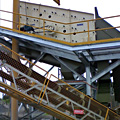APPLYING SCREENING TECHNOLOGY IN A RECYCLING SCENARIO
January 27, 2015
Anyone who’s had the dubious pleasure of visiting a recycling centre knows the capacity society has for wastage. Stinking mountains of trash are piled haphazardly across the floor, and no open space is to be seen. It’s something of a shock to scan this mess of plastic bottles, rusty metal containers, and unidentifiable bits of garbage, but there’s an undercurrent of order within the chaos. Look close enough and see the scrap metal and empty detergent bottles being funnelled towards sorting mechanisms. This is a recycling environment, a centre of mechanical separation designed to sort garbage into separate bins and gift garbage with a second chance of life.
PRIMARY SCREENING
Swinging away from the horrendous disposal tactics mankind uses to dump rubbish in landfills, recycling depends on the sorting of raw waste in a dedicated facility. Manual loading places the stream of matter on conveyor belts and injects the mess into the gateway stage of the process. The following stages are a formalized stream of metal and plastic, glass and aluminium, with the motorized flow passing through a series of vibrating feeders and screens. Unfortunately, in comparing this arrangement to the dedicated systems used in mining and quarrying, the predictable processing of aggregate and ore is replaced by a more variable load. The challenges of moving from raw input to a final objective where the output has been satisfactorily processed are thus vastly more complicated, which is why there are many recycling solutions for screening.
THE BRANCHING OF THE RECYCLING CYCLE
Loaded for sorting, garbage comes in many shapes and forms. Refuse trucks pick up home disposal bins and spew forth plastic bottles and uneaten food, but what about industrial waste? Heavy rocks from a construction site will require a dramatically different solution to rotten lumber or metal scrap.
The communities and businesses in our towns and cities do their own parts to separate recyclable matter, keeping materials in different bins, but recycling centres still require potent answers to process these items into their constituent parts. Here’s a quick rundown of some of the options available within the dedicated recycling facility.
- Demolition debris and construction material recycling
- Forestry recycler
- Reclaiming energy with a waste to wattage solution
- Heavy-gauge rock and scrap metal reprocessing
Pounding wood into chips for playground surfacing, turning rock and used construction materials into productive materials while magnetically separating metal, a recycling process involves many levels of separation. Thermoplastics are reclaimed and paper is turned to pulp in a chemical soup. Finally, spent solid fuel and biodegradable refuse is being re-energized and converted into innovative power sources that complement the environmentally-friendly strategies of the future.
Screening Technology Pty Ltd T/AS Hawk Machinery
Address: 7 Lantana St Blackburn North Vic 3130
Contact Person: Bohdan Blaszczyk
Phone: +61 3 9877 7777
Fax: +61 3 9877 8177
Mobile: 0411 099 989
Email: info@hawkmachinery.com.au
Optimized by NetwizardSEO.com.au
Optimized by: Netwizard SEO


